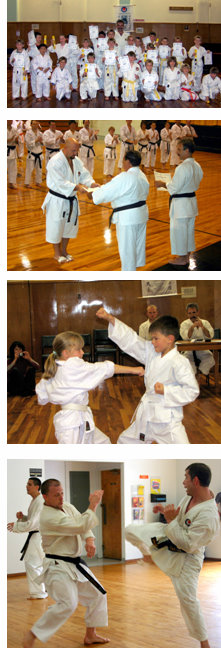Student Development

Karate Rank and Testing
The Shotokan Karate Napier Club is dedicated to developing our youth and adult students to a high level of ability in all aspects of Shotokan Karate-do. Regular training, seminars & camps, competitions and examinations are all important parts of achieving that goal.
We are a proud member of SIA-New Zealand. As such, all ranks are officially recorded with the SIA and recognized by traditional karate organisations throughout the world.
Coloured belts and karate ranks are awards of recognition presented to indicate the progress of the student in mastering the mental and physical aspects of karate. All students start with white-belts, signifying that they are beginners. With regular, focused practice it takes between three and five years to earn a black-belt.
Since all students are individuals with different potential and rates of development, it is essential that, for testing, one student not be compared to another. Grading should only be used as a tool to measure each students’ own individual improvement. The true opponent, in testing and karate in general, is yourself.
The examiner grades the student on many factors, including:
• Form (kata)
• Basic techniques (kihon)
• Sparring (kumite)
• Correct timing, distance and judgement
• Mental, physical and emotional strength
• Etiquette and manners
As a student progresses towards black-belt, the following factors are also taken into consideration:
• Character
• Training attitude and commitment
• Hours of training
• Age
• Individual handicaps and limitations
PLEASE NOTE:
Karate progress is individually paced. All of the students will not be ready to test at every test. Parents, please help your child understand that it is OK if they don’t test every time an exam is held. Students are only allowed to take an exam when they are technically ready, and also ready emotionally to assume the responsibilities of the next rank.
Fees and Frequency
The examination fee is $40.00 NZ per test, and includes an association patch (after the first exam), an international Certificate of Rank, and a new Coloured Belt when required. Youth students are nominated by the instructor for examination and generally test every three-four months up to Purple-belt/ black-stripe and every six months after that. Adult students are eligible to test every three months up to 4th kyu and every six months after that.
However, students that train at a very high rate may be nominated to test more frequently. In addition to their regular training, students at green belt level and higher are expected to participate in two competitions or special training sessions per year.
Please click on the links below to see test criteria:
SIA – Black-belt Test Criteria
